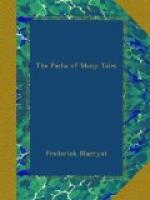“Giaffar,” replied the caliph, “I am overwhelmed with distressing inquietude, and would fain have thee devise some means for my relief. Speak—what sayest thou?”
“Hasten, O my prince, to thy favourite garden of the Tierbar, where, gazing on the bright moon, and listening to the voice of the bul-bul, you will await in pleasing contemplation the return of the sun.”
“Not so,” replied the caliph.
* * * * *
“By the beard of the Prophet! the caliph was right, and that Giaffar was a fool. I never heard that staring at the moon was an amusement before,” observed the pacha.
* * * * *
“Not so,” urged the caliph. “My gardens, my palaces, and my possessions, are no more to me a source of pleasure.”
* * * * *
“By the sword of the Prophet! Now the caliph appears to be the fool,” interrupted the pacha.
* * * * *
“Shall we then repair to the Hall of the Ancients, and pass the night in reviving the memory of the wise, whose sayings are stored therein?” continued Giaffar.
“Counsel avails not,” replied the caliph; “the records of the past will not suffice to banish the cares of the present.”
“Then,” said the vizier, “will the light of the world seek refuge from his troubles in a disguise, and go forth with the humblest of his slaves to witness the condition of his people?”
“Thou hast said well,” replied the caliph; “I will go with thee into the bazaar, and witness unknown the amusements of my people after the labours of the day.”
Mesrour, the chief eunuch, was at hand, and hastened for the needful disguises. After having clad themselves as merchants of Moussul, and tinged their faces of an olive hue, the caliph, accompanied by Giaffar and Mesrour, the latter armed with a scimitar, issued forth from the secret door of the seraglio. Giaffar, who knew from experience the quarter likely to prove most fertile in adventure, led the caliph past the mosque of Zobeide, and crossing the Bridge of Boats over the Tigris, continued his way to that part of the city on the Mesopotamian side of the river which was inhabited by the wine-sellers and others, who administered to the irregularities, as well as to the wants of the good people of Bagdad. For a short time they wandered up and down without meeting anybody; but passing through a narrow alley, their steps were arrested by the sound of a most potent pair of lungs, carolling forth a jovial song. The caliph waited awhile, in expectation of its ceasing; but he might apparently have waited until dawn of day, for verse was poured forth after verse: a small interval between them filled up by the musical gurgling of liquor from a bottle, and the gulps of the votary of Bacchus. At length, his patience being exhausted, the caliph ordered Mesrour to knock loudly at the singer’s dwelling. Hearing the noise, the fellow opened the jalouise, and came out into the verandah above. Looking down, and perceiving the three interrupters of his mirth, he bawled out—“What rascals are you that disturb an honest man at his devotions?—Begone!—fly!—away with you, scum of the earth!”




